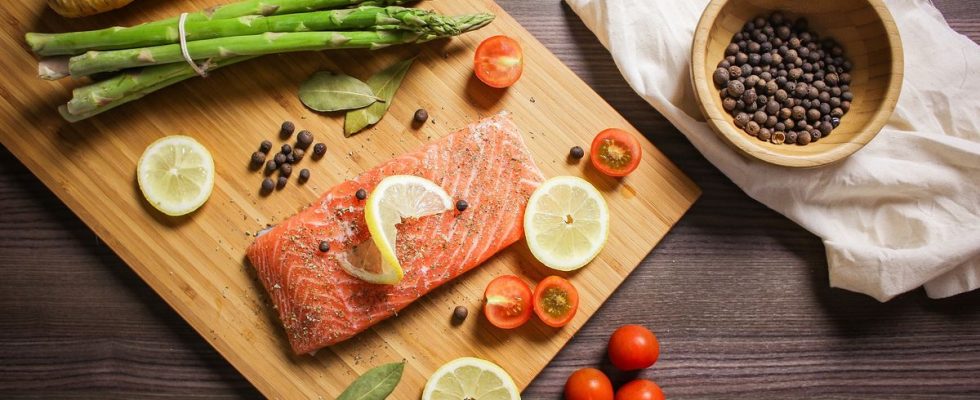In some, they land with fanfare. The English, the stuff, the ragnagnas: whatever you call them, periods and the premenstrual syndrome that precedes them return every month, bringing in their wake pain, bloating, blood loss, jagged moods and fatigue . And among other things, periods can also trigger sugar cravings.
In short, a long and painful week for many, clinging like a lifeline to their box of ibuprofen and their chocolate bar. What if the contents of our plate could help us get through this recurring zone of turbulence? What foods to favor to find a little comfort? And which ones to avoid?
Focus on anti-inflammatory foods
During menstruation, the body produces prostaglandins, hormones that will promote contractions of the uterus and thus facilitate the expulsion of the uterine lining, via bleeding. “Premenstrual syndrome (PMS) and periods have a pro-inflammatory effect on the body, and are accompanied by a set of uncomfortable inconveniences, confirms Marie-Laure André, dietician-nutritionist and author of the blog Passion for nutrition. It is therefore recommended to promote foods with anti-inflammatory properties: those that are rich in omega 3, such as fatty fish (salmon, sardines or herring), oilseeds, certain oils such as flaxseed or walnuts, or even chia seeds”.
Another food to favor during PMS and menstruation: turmeric, used for a very long time in traditional Ayurvedic and Chinese medicine for its anti-inflammatory properties, which can be consumed in particular as an infusion to relieve painful menstruation. It is also advisable to drink plenty of water during this period. One can choose one rich in magnesium to relieve intestinal disorders.
And if you are subject to very heavy bleeding, “it is important to ensure that you have a good iron intake, insists the dietician-nutritionist. We focus on spinach and other green leafy vegetables, rich in vitamins and vegetable iron. As well as on lentils or black pudding. And if you like tea, it is better to consume it away from meals: the tannins it contains limit the absorption of iron by the body. And for those in whom menstruation can even cause anemia, iron supplementation may be indicated.
Avoid pro-inflammatory foods
Logically, all pro-inflammatory foods, which are generally not recommended and should only be allowed occasionally and in small quantities, should be avoided during menstruation. “This is the case with red meat and ultra-processed, industrial products, stuffed with sugar, fat and chemical additives. These foods are known to have deleterious effects on health, can cause menstrual disorders and influence estrogen levels”.
Another essential during menstruation for many women, as we have said: cravings for sugar. Even without being a sweet tooth, many of them cannot resist the appeal of candies, chocolates, cookies and other industrial treats. “It’s a phenomenon that almost all women know, confirms Marie-Laure André, with not only sugar cravings, but also more appetite”.
Control your sugar cravings
This increase in appetite is also “linked to the loss of blood: the body requires more energy, continues Marie-Laure André. But there is also the psychological aspect: during this period, you may want to eat more, and more sugar, because of jagged moods: it is the craving for sugar to seek appeasement. This is why I always advise my patients to make the connection between these two phenomena: recognizing that we crave sugar because the period is coming, and accepting this state of affairs. It allows you to get out of guilt and stress.
To counter these cravings, “you must not be too restrictive, which can quickly lead to cracking, she insists. Since we have a higher energy expenditure, we can increase our portions or make a snack, to regulate our appetite”. And to better control your cravings, “which are more intense at this time, you don’t have to completely eliminate sugar, reassures the dietician-nutritionist. We can allow ourselves a sweet pleasure, rather at the end of the meal to limit the impact on the body”. In practice, you can prepare for dessert or snack “a snack based on skyr, this yogurt rich in protein, with a slightly gourmet accompaniment, such as a fruit coulis or grated dark chocolate, suggests Marie-Laure André . You can also add granola and fresh raspberries”.
And for sweets addicts during your period, “you can avoid industrial versions by preparing yourself healthier and just as tasty alternatives to your favorite biscuits, recommends Marie-Laure André, who offers recipes on her blog to low glycemic index. We can thus have fun without generating a spike in blood sugar that will trigger the next craving, and have fun by avoiding all synthetic additives”.

